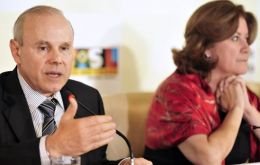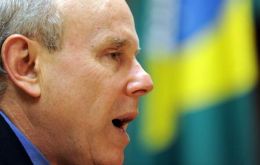MercoPress. South Atlantic News Agency
Tag: Brazilean budget
-
Tuesday, November 22nd 2016 - 13:38 UTC
Fiscal vulnerability of Brazilian economy exposed at a business conference

Brazilian President Michel Temer warned on Monday that the national debt could swell to the size of the country's gross domestic product within eight years should public spending not be brought under control and fiscal reforms not enacted.
-
Wednesday, September 16th 2015 - 09:45 UTC
Rousseff's latest austerity measures, 'hard to pass' warn congress leaders

President Dilma Rousseff's latest austerity plan to rescue Brazil's sinking economy faced a cold reception Tuesday, with Congress raising questions over whether the measures will win approval. The speaker of the lower house of Congress and one of Rousseff's chief foes, Eduardo Cunha, dismissed the measures as “pseudo cuts” and predicted they would not easily pass.
-
Thursday, September 10th 2015 - 08:50 UTC
Business lobbies feeling the pinch, impatient with Rousseff's budget cuts

After months of trying to shore up Brazil's public finances, President Dilma Rousseff now faces political and business pressure to ease up on painful austerity measures in a country long hooked on the helping hand of a big state.
-
Friday, February 21st 2014 - 07:12 UTC
Brazil announces budget spending cuts to meet primary budget surplus

Brazil's government on Thursday announced 44 billion Reais (18.41 billion dollars) in spending cuts as it seeks to meet its primary budget surplus target for 2014. This year's cuts exceed the 38 billion Reais (some 15.9 billion) in budget reductions announced in 2013 and extend to all government departments except education, health, social development, and science and technology.
-
Saturday, January 4th 2014 - 04:38 UTC
Mantega releases crucial data to calm market anxiety about Brazil's accounts

Brazil's Finance Minister Guido Mantega insisted on Friday that the government is keeping spending under control as he sought to calm anxiety about the deterioration of the government's accounts. The minister said the primary budget surplus, (excess of revenue over expenditure before debt payments) would be above the goal of 73 billion Brazilian Reais for 2013 (30.5bn dollars), equivalent to about 1.5% of gross domestic product.
-
Friday, February 1st 2013 - 07:05 UTC
Brazil’ overall budget deficit: 2.47% of GDP and primary surplus of 2.38% GDP

Brazil failed to reach its primary budget surplus goal last year posting a primary surplus of 104.951 billion Reais (53 billion dollars), the equivalent of 2.38% of GDP, according to central bank data released this week, which was below the annual target of 139.8 billion Reais, approx 3.1% of GDP.
